Current Postgraduate Research Projects
Katherine Breeden | European Conservatoire Clarinet Pedagogies in Higher Education: An Exploration of Teacher-Student Interaction and Communication within the Conservatoire Learning Environment
-150x210.jpeg)
My research is a qualitative exploration of collegiate clarinet pedagogy in third level conservatoires in Ireland (Cork School of Music at Munster Technological University, Royal Irish Academy of Music, and Technological University Dublin Conservatoire) and one additional conservatoire located in Europe. It focuses on aspects of the conservatoire learning environment including teacher-student interactions, modes of communication (modelling, physical gestures, language used), and underlying teaching philosophies. Through observing and interacting with conservatoire learning environments I hope to gain insight into effective clarinet pedagogy and foster a collaborative dialogue among teachers and students with the goal of providing a better educational experience for all conservatoire students.
Supervisors: Dr Helen Lawlor and Dr Paul Roe
Patrick Burke | The 21st Century Bass Clarinettist and the Emergence of a Praxis
Patrick is a professional clarinet/bass clarinettist who regularly performs with the National Symphony Orchestra of Ireland, RTÉ Concert Orchestra, Ulster Orchestra, Crash Ensemble, and Irish National Opera, among others. His research investigates the praxis of Bass Clarinet performance in the twenty-first century. This artistic research takes his own activities as a professional orchestral and chamber musician as the lens through which to critically examine his current practice paradigm, with a view to developing a broad-based performance practice for the Bass Clarinet, using autoethnography as his primary methodology.
Supervisors: Dr Paul McNulty and Dr Paul Roe
Aileen Cahill | The Use of Mental Practice in Music Performance Preparation: A Collaborative Pianist’s Investigation
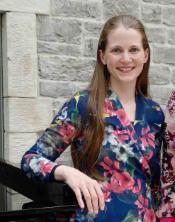
This is a collaborative pianist’s investigation into the use of mental practice in music performance preparation. It is conducted through the observation of and reflection upon the preparation and performance of a variety of contrasting works, inclusive of solo piano and instrumental chamber repertoire. Extant research has highlighted the lack of documentation of the use of this practice technique from a musician’s perspective. This research project looks to contribute towards that, through the identification and discussion of factors that affect the practical implementation of mental practice in music performance preparation.
Supervisor: Dr Paul McNulty
Helen Doyle | Voices of the Feis Ceoil: Choral and Operational, 1897–1932

The focus of this Research Foundation for Music in Ireland doctoral project is the Feis Ceoil. This large-scale annual competitive event, has provided huge stimulus to all facets of Irish musical life its almost 130-year lifespan, a considerable duration which has been characterised by sustained enlargement. This research project examines the festival’s origins, systems, and complex operational structures wherein Feis Ceoil networks central to its establishment and expansion were formed. The role of key personnel reveals the contributions of committee members both within the Feis’ boardroom and on its competitive and concert platforms. The project also maintains a specific focus on choral music within the Feis since its inception. Examination of trends of choral participation reveals peaks and troughs of activity, but also the Feis’ ability to pivot and reimagine its choral platforms, continuously evolving in response to Irish society in the period 1897–1932.
Supervisors: Dr Maria McHale and Dr David Mooney
Rachel Duffy | Traditions and Transformations: Harping in Ireland 1960-2005
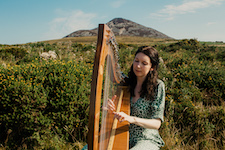
This project explores the transformation of the Irish harp landscape between the establishment of Cairde na Cruite in 1960 and the World Harp Congress in Dublin, Ireland in 2005. It adopts a case study approach, grounded in musicological research to examine the multifaceted careers of five harpists central to this transformation: Derek Bell (1935–2002), Mercedes Garvey (1925–2013), Nancy Calthorpe (1914–1998), Sheila Larchet Cuthbert (1923–) and Gráinne Yeats (1925–2013).
Supervisors: Prof. Clíona Doris and Dr Kerry Houston
Ella Fallon | The Performance Style of Cécile Chaminade (1857–1944): An Analysis of her Gramophone Recordings and Duo-Art Piano Rolls
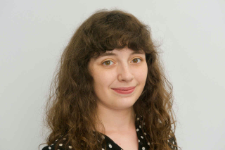
Cécile Chaminade was a prominent French composer and pianist who had an exceptional output of some four-hundred published works. From the age of eighteen, Chaminade enjoyed a successful performance career, with concert tours throughout Europe and in America. However, her role as an early recording artist has not been explored despite numerous disc recordings and piano rolls. This project aims to investigate Chaminade’s performance style through a combination of aural and written sources. Analysis of her recordings will be combined with an examination of her writings and published scores to further understand her interpretation of her work. Bringing these elements to light increases understanding of her stylistic approach in the context of late-nineteenth and early-twentieth century pianism, and contribute to scholarship in the areas of both early recordings and women in music.
Supervisor: Dr Maria McHale
Kevin Free | Composition Portfolio with a focus on Speech Melody and Orchestral Works
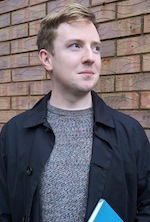
Kevin Free’s research into composition is focused on the human voice, and its integration into music, though electronic and artistic means. This comes in a variety of outputs, through fixed media and instrument, while using fragments of advertisements and instructional videos as the bases of these compositions, and pieces for voice and piano, as well as voice and chamber orchestra.
Supervisor: Prof. Gráinne Mulvey
Jimmy Goeijenbier | Contemporary Irish Piano Music: Perspectives on Practising and Performing the Commissioned Works of the Dublin International Piano Competition

This research project, funded by the Irish Research Council’s Government of Ireland Postgraduate Scholarship Programme, explores the processes involved in preparing contemporary classical piano pieces for performance, specifically focusing on forty-one works by Irish composers commissioned for the Dublin International Piano Competition between 1988 and 2022. The project involves documenting the researcher's own practice sessions through written and video journals, as well as collaborating with the composers of the commissioned works and conducting interviews with them in addition to individuals in other organizations involved in the commissioning process. The research aims to contribute to Irish musical culture and pianism in Ireland through live performances and recordings of the commissioned works, and to disseminate findings that will impact how musicians practice for performance.
Supervisors: Dr Mary Lennon and Dr Maria McHale
Fiona Gryson | Harp Pedagogy in Ireland, 1975-2022: Context, Practice, Performance and Repertoire
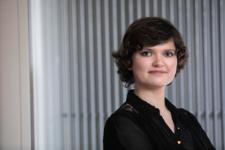
This project, funded by the Irish Research Council’s Government of Ireland Postgraduate Scholarship Programme, examines the harp educational landscape in Ireland and aims to build a comprehensive, incremental, pedagogical framework embracing historical and contemporary contexts. Underpinning the study is an investigation and analysis of current harp pedagogical practice in Ireland. The point of departure is the publication of the seminal pedagogical resource The Irish Harp Book: a tutor and companion by Sheila Larchet Cuthbert, first published in 1975. The repertoire and technical exercises in this publication are being recorded in their entirety for the first time, including works by several of Ireland’s leading composers. The study will also develop an annotated pedagogical catalogue of Irish works and arrangements for harp to develop a comprehensive, multimedia, and pedagogical resource. It is envisioned that contemporary Irish composers will be commissioned to enrich the resource and to fill any pedagogical gaps identified, hence continuing the ethos and legacy of The Irish Harp Book.
Supervisors: Prof. Clíona Doris and Dr Helen Lawlor
Stephen Kelly | An analysis of Gustav Mahler’s Use of Timpani in his Symphonies, with Reference to the Influence of Historical Performance Practice on Contemporary Performance of his Works.
While there is a vast amount of research on Mahler as a composer, little has been undertaken specifically in relation to his writing for timpani, and his influence on the development of the instrument. This study will generate a detailed analysis of the timpani parts in Mahler's symphonies. It will question how Mahler, both as composer and conductor, directly influenced late 19th- and early 20th-century timpani trends. Furthermore, it will examine how these trends have been influenced by performer-pedagogues who assumed the role of tradition bearers and how Mahler's influence on timpani may be viewed through his association with those two important orchestras: the Vienna Philharmonic and the New York Philharmonic. Through historical and qualitative research, case studies, and narrative inquiry, the influence of Mahler’s compositional methods on historical and current timpani performance practice and pedagogy will be investigated and explored and will form a starting point for new and hitherto undiscovered aspects of Mahler’s style.
Supervisors: Prof. Una Hunt and Dr Helen Lawlor
Julia Mahon | Techniques of Current Song Writing/DJ-ing and Current Issues of Social Importance as a Construct for Contemporary Classical Pieces
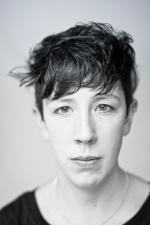
This research investigates the blurred area between song writing and composition and questions ideas of perceived elitism in art music and the academic world; and supporting the idea that artistic endeavours with integrity are of equal merit. These ideas are being explored through the composition and performance of a song cycle; for choir and ensemble of piano/synths, samplers, backing tracks, drums, brass and strings.
The work will be utilising standard equipment from the pop/hip hop genres and bringing them into a more contemporary classical setting, through the use of drum machines, standard guitar pedals, samplers and synthesizers and vocal harmoniser pedals. Themes of social influence and inclusion are also present, as the material uses the work of immigrant/LGBTQ+ poets living in Ireland. Questions around the integration of backing tracks, the validity of, and the most effective way of achieving expression through this, will also be investigated.
Supervisor: Prof. Gráinne Mulvey
Michael Robert Cummins | Societal and Cultural Influences on Schemas in Irish Art Music from the Late Twentieth Century to the Present: An Autoethnographic Approach Through Composition

From the late nineteenth century into the beginning of the twentieth century, societal and technological developments took place that subsequently influenced the course of music throughout the remainder of century. In this context the project seeks to examine what changes and developments have taken place in Irish society and culture from the latter quarter of the twentieth century to the present day and how they have impacted composition in Ireland into the twenty-first century.
Core to this project will be the composition of new work and documenting the creative processes involved. This project will examine how Irish socio-cultural influences have impacted the development of schemas in composition with specific reference to my own personal experiences in Irish society and culture. The project will explore the meanings and implications for composition as determined by the outcomes of these findings.
Supervisor: Prof. Gráinne Mulvey
Emma O’Keeffe | ‘No Coward Soul is Mine’: A Critical Edition of Select Works by Ina Boyle (1889–1967)

Emma is a final year research student whose thesis examines a collection of edited works by prolific twentieth-century Irish composer, Ina Boyle, whose work has only recently come to prominence. These include Elegy (1913) for cello solo and orchestra, Psalm (1927) for cello solo and orchestra, Virgilian Suite (1930–31), a ballet suite for dancers and orchestra, Lament for Bion (1944–45) for tenor solo and string orchestra or string quartet, and Three Ancient Irish Poems (1958) for soprano solo, viola and harp. This selection includes one work from each decade of Boyle’s compositional career, whilst also covering a range of musical genres including, orchestral, chamber, vocal and stage works. In addition to her doctoral studies, Emma is a member of the Ina Boyle Society Limited (www.inaboyle.org). To date, Emma’s editions have resulted in several recordings of Boyle’s music including the albums Cello Abbey (2017) and Ina Boyle (2018); the latter is the first CD dedicated entirely to the composer’s orchestral works. This project aims to advance the knowledge of twentieth-century Irish art music and composers, and to stimulate an interest in other scholars to discover Boyle’s music and to create future typeset editions from her large collection of neglected compositions.
Supervisors: Dr Kerry Houston and Dr Maria McHale
Roddy O’Keeffe | The Guinness Choir (1951–1984)

This project focuses on The Guinness Choir in the period 1951–1984 when it was inaugurated and subsequently led by Victor Leeson (1920–1986). This investigation aims to shed light on the importance of a choir that is still in existence but has had little scholarly attention to date. The particular emphasis on the early decades will focus much of the discussion on Leeson, who has been overlooked despite having made an important contribution to Dublin’s musical life in the second half of the twentieth century.
Supervisors: Dr Kerry Houston and Dr Maria McHale
Sandra Oman-Farren | Puccini's Manon: A Holistic Approach to Role Preparation and Execution

The fulcrum of this PhD research, funded by the Irish Research Council’s Government of Ireland Postgraduate Scholarship Programme, is operatic role preparation and execution, an investigation into how the conscientious singer-actor can ‘become’ the character of ‘Manon’ in Giacomo Puccini’s 1893 opera, Manon Lescaut. Adopting a multi-stranded research strategy, encompassing traditional methodologies and a series of ‘lived experience’ interviews with international operatic practitioners, the actuality of performing this complex role is considered, with recommendations and conclusions drawn from a multiplicity of sources. The ultimate aim of the research is to formulate a holistic strategy for future interpreters of Puccini’s Manon.
Supervisors: Prof. Una Hunt and Dr Rachel Talbot
Aleksandr Nisse | The Application of the Precise Partial Pitches of the Harmonic Series
This research is a proposed realisation of how a system of organized pitch-based sounds can be obtained with the exact partial pitches of the spectrum of the harmonic series. It investigates the design of new structural sound entities and develop new approaches into timbral research. The precise partial pitches simulation is realised via the medium of virtual pipe organs. The organ, being the instrument with the highest frequency range of all instruments allows the application of the partial pitches in all possible registers.
Supervisor: Prof. Gráinne. Mulvey
Enrica Savigni | Johann Kaspar Mertz and Josephine Plantin: Romantic Repertoire for Guitar and Piano
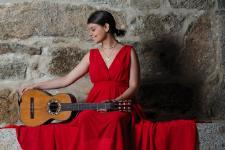
My DMus Research Project focuses on the repertoire for guitar and piano written by guitarist Joseph Kaspar Mertz (1806–1856) and pianist Josephine Plantin (1819–1903), one of the last important duos active in central Europe in the mid-nineteenth century. My research explores the relationship between the repertoire and the characteristics of historical instruments by studying and performing original works for the duo and comparing different pairs of historical instruments to explore their unique sound possibilities. Part of the project consists in transcribing for the piano and guitar duo several works written by male and female romantic composers, drawing inspiration from the transcription works of Mertz and Plantin.
Supervisors: Prof. Clíona Doris and Dr Maria McHale
Ian Cecil Scott | 3D ORCHESTRATION

Ian Cecil Scott is a PhD candidate in music composition under the supervision of Prof. Gráinne Mulvey. His project, titled “3D orchestration” and funded by the Irish Research Council Government of Ireland Postgraduate Scholarship Programme, aims to deconstruct the traditional ways of writing and performing music, by moving away from a stereophonic approach and towards a fully immersive experience. On a practical level he aims to reorganise the musicians’ standard positions and orchestral space in live performances as well as investigate ways to record and reproduce the 3D orchestra in order to apply it to film scoring.
Supervisor: Prof. Gráinne Mulvey
Marta Siermantowska | Richard’s Resonating Riches: Exploring the Versatility of the Button Accordion Through the Multilateral Music of Richard Galliano
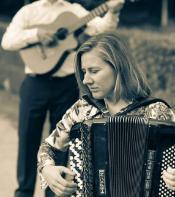
The objective of this project is to examine the music of Richard Galliano. This thesis will explore his unique identity as a jazz accordionist. Galliano is a versatile performer and composer writing specifically for the instrument he plays. The origins of his musical language and his ways of arranging and artistic expression will be investigated. The analysis of his stylistic characteristics will be analysed in relation to the idiosyncrasies typical for the button accordion. This thesis will include transcriptions of selected musical material and the writing of critical analysis of these transcriptions; also, a transcript of an original interview with Richard Galliano.
Supervisors: Dr Daragh Black Hynes and Dr Mike Nielsen
Joan O'Malley | Teaching Vocal Onset: An Examination of the Origins and Evolution of Onset Practice and Nomenclature in Western Classical Vocal Pedagogy
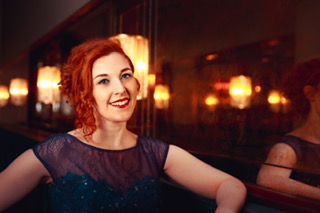
A secure and consistent vocal onset (i.e., the initiation of the sung tone) is the lynchpin of vocal technique, as it facilitates a beneficial cycle of effective breath management and optimal vocal fold closure. However, many current voice training systems tend to focus on related concepts including acoustics and the Accent method breath management system.
With the hypothesis that the concepts around vocal onset may be an underused resource in vocal pedagogy, this research will identify the most effective tools and techniques currently used to teach onset among a wide range of third-level and Conservatory singing teachers. Using a representative sample of teachers across all voice classifications and with diverse pedagogical perspectives, their responses will be used to formulate an holistic and cohesive protocol for assisting singers in achieving a desirable initiation of vocal tone.
The first phase of the project will use a case study design to facilitate a detailed exploration, through interview and observation, of third-level singing teachers’ practice of onset pedagogy. Phase two will follow an action research design, and will encompass the implementation of an onset-focused teaching protocol during working sessions with third-level and early-career singers. This new protocol will encompass the distillation of the optimal onset teaching practices identified during the case studies.
The concept of vocal onset has a hitherto underappreciated utility in illustrating the interrelatedness of apparently disparate aspects of vocal technique. A clear protocol for teaching onset will assist singing teachers in communicating key pedagogical concepts through a single and comprehensible focus. It will empower vocal students engaging with a variety of teaching approaches, and will also benefit the wider singing community, including the growing “Singing for Health” cohort.
Supervisors: Dr Rachel Talbot and Dr Helen Lawlor
Completed Postgraduate Research Projects
Integrating Sensor Technology into Artistic Practice: A critical examination of the role of the performer, Marcella Barz, 2022
Metamorphosis, Microtones and Modes: Composition Portfolio with Commentary, Daragh Black Hynes, 2021
George Van Eps’s Harmonic Mechanisms for Guitar: Concepts and Influence on Jazz Guitar Education and Performance Practice, Jimmy Brennan, 2021
The Pedal Harp Tradition in Ireland (c.1790-1900): Practitioners, Pedagogy, Trade and Repertoire, Clare McCague, 2021
Hymnals as Historical Documents: A Contextualisation of the Church Hymnal and its Representation of the Church of Ireland and its People 1864–1919, Nicole Robinson, 2021
The Influence of Santería in Leo Brouwer's Solo Guitar Works (1955–1993), Eoin Flood, 2020
Composing Irishness: Remembrances of the Irish Past Through the Prism of the Present in Music by Donnacha Dennehy (b. 1970) and Jennifer Walshe (b. 1974), Timothy Diovanni, 2020
J.K. Mertz’s Bardenklänge: A Context for the Emergence of the Character Piece Genre within the Repertoire for Solo Guitar, Brinsley Doran, 2019
Measuring Expressive Music Performances: a Performance Science Model using Symbolic Approximation, Eamon O Doherty, 2019
Finding A Voice – Exploration of Modes and Timbres : A portfolio of ten original compositions with accompanying commentaries, Ekapon Muenyam, 2019
Agents of Change: A Multi-Layered Approach to Violin Learning and Teaching, Leslie-Gail Ellis, 2018
‘When Evening Shadows Fall’: The Development of the Composition of Irish Traditional Dance Music in the ‘East Galway Style’ from c.1950, Robert Harvey, 2018
John Williams: An Evaluation of his Impact Upon the Culture of the Classical Guitar, Michael O'Toole, 2018
Examining the Irish Art Song: Original Song Settings of Irish Texts by Irish Composers, 1900-1930., David Scott, 2018
Accretion and Acrylics: Composition Portfolio with Commentary, Patrick Egan, 2017
The Evolution of the Radio Éireann Symphony Orchestra 1926–1954, Patrick Joseph Kehoe, 2017
The Creation of Meaning and Identity in the Dublin Jazz Scene, Past and Present., Damian Evans, 2016
Creolisation in Music Traditions: South Connemara, the Scottish Western Isles and Francophone Louisiana, Brian Ó hUiginn, 2016
Breakdown: Vol 1: Text and Music, A Survey Of Methodology And Process, Vol 2: In Full Score., Andrew Synnott, 2016
Synthesising Folk Influences and Contemporary Compositional Techniques in Pursuit of an Original Musical Language, Alyson Barber, 2015
Five-String Fiddle and the American Vernacular, Patrick Daly, 2015
